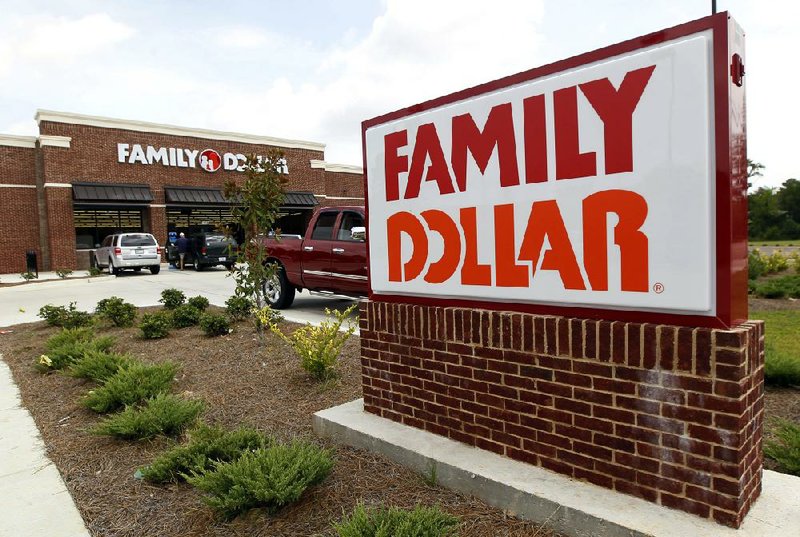Correction: Dollar Tree has agreed to acquire Family Dollar for $74.50 a share, which consists of $59.60 in cash and $14.90 in Dollar Tree shares. A reference to the deal in this story incorrectly stated the two companies’ positions in the planned transaction.
Variety store Dollar General isn't giving up on its plans to acquire fledgling competitor Family Dollar, even though Family Dollar rejected an earlier Dollar General offer that was already more attractive than the one it inked with a third rival, Dollar Tree.
On Monday, Dollar General increased its cash offer to $80 from $78.50 per share and increased the number of stores it said it would be willing to divest to 1,500 from 700. The company also said it would be willing to pay Family Dollar a $500 million reverse break-up if the deal failed to pass antitrust scrutiny.
Family Dollar has already agreed to acquire Dollar Tree for $74.50 a share, which consists of $59.60 in cash and $14.90 in Dollar Tree shares.
Last month, when Wal-Mart discussed its second-quarter earnings with the media, Chief Financial Officer Charles Holley snuffed out the idea that the pending Dollar Tree/Family Dollar deal would put pressure on Wal-Mart in the small-store format arena. He said Wal-Mart's smaller-format stores -- hundreds of Neighborhood Markets and dozens of Express stores -- can sell between three and eight times what some of the dollar-type stores do.
"Our focus really remains on our business and what we feel works for us, versus what other people are doing out there. We pay attention to it, but like I said before, we really like the position of our small stores, our Neighborhood Markets and even the pilot Express," Holley said.
"For us, it's a real winning combination when you add the fresh [produce], the gasoline, when you add the prescriptions -- and even frozen [goods] -- we have more frozen than others. And it's really put us in a good position in the small store sector," he said.
"We very much like our format," he added.
George Anderson, editor-in-chief and associate publisher of RetailWire LLC, said the likelihood that Wal-Mart would want or try to enter into the dollar-store fray would be "bordering on science fiction."
"I would be highly surprised if they did, largely because Wal-Mart has its own small-store strategy going, one that I think they believe pretty strongly in," Anderson said.
Even though Wal-Mart is not a likely buyer, Anderson said, they're probably watching the bidding with great interest. He said former Wal-Mart CEO David Glass "identified dollar stores as a likely major competitor to Wal-Mart going forward." The first Neighborhood Market was built in 1998 and Glass left Wal-Mart in 2000.
Dollar General is the strongest of the dollar-store chains. Howard Davidowitz, chairman of Davidowitz & Associates Inc. in New York, also referenced Glass. He said late in Glass' tenure, Glass said the biggest challenge he would leave his successors was to develop small stores.
"He said, 'We can't just let Dollar General, Family Dollar and Dollar Tree ... we can't let these guys clean up the field and have this kind of advantage on us with convenience,'" Davidowitz added. "That was 20 years ago."
Wal-Mart said in February that it would build up to 300 new Neighborhood Markets and Express stores in fiscal 2015, which ends Jan. 31. Any plans for capital expansion after that won't be released until the retailer has its annual meeting with the investment community in October, Wal-Mart spokesman Randy Hargrove said Monday.
Still, Davidowitz doesn't think the retailer is acting fast enough to keep up with the dollar-type stores, especially when it looks like two of them will be joining forces.
"Whatever they do will be a pimple on the back of an elephant," Davidowitz said of Wal-Mart. "They can't be impacted by what they're doing. Once again, Wal-Mart is asleep at the switch."
Daniel Jennings, a regular contributor to Seeking Alpha, a crowd-sourced content service for financial markets, gave several reasons Monday for Wal-Mart to pass on Family Dollar: Family Dollar's revenues are too small to justify the cost of an acquisition; Family Dollar's stock is overpriced; Family Dollar would not be a good fit with the Wal-Mart Express business model because it lacks gas pumps and pharmacies; Wal-Mart does not want or need Family Dollar's low-income customers; and Wal-Mart needs more middle and upper income shoppers like those who are defecting to Costco and Amazon.
Business on 09/03/2014

